The beauty of the Mediterranean diet is that it is not a diet, but the principle of a balanced diet.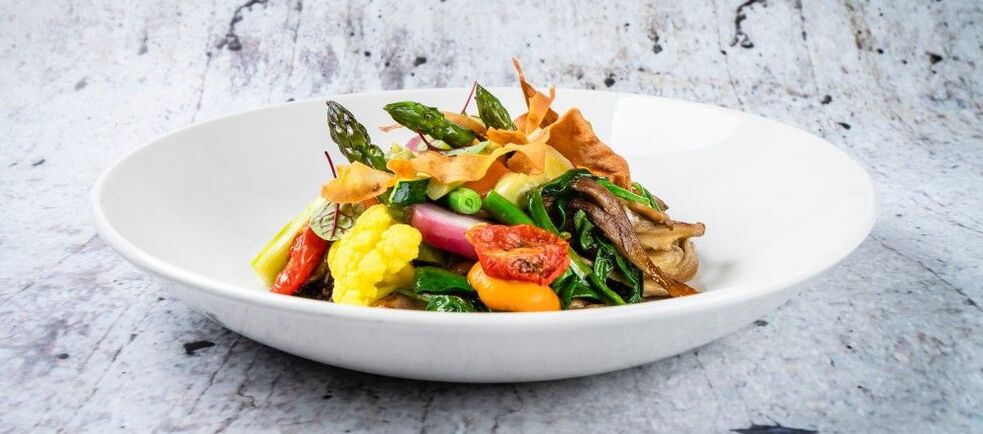 As a rule, almost all diets show severe restrictions, it is very desirable to do under the supervision of a doctor, and have contraindications. The Mediterranean diet is suitable for everyone, including children, pregnant women and the elderly. Even if you are allergic or intolerant to certain foods, those foods are easily replaced by other foods. You will not be hungry and depressed. Instead, you will really enjoy your food. Not necessarily the people of this region have good health and cheerfulness.
As a rule, almost all diets show severe restrictions, it is very desirable to do under the supervision of a doctor, and have contraindications. The Mediterranean diet is suitable for everyone, including children, pregnant women and the elderly. Even if you are allergic or intolerant to certain foods, those foods are easily replaced by other foods. You will not be hungry and depressed. Instead, you will really enjoy your food. Not necessarily the people of this region have good health and cheerfulness.
The Mediterranean diet is a lifestyle that allows you to be healthy, rarely get sick and prolong youthful life. Thinking of adjusting the diet towards proper nutrition, learn the principles of the Mediterranean diet.
In 2010, the Mediterranean diet gained official UNESCO status as an intangible heritage of the Mediterranean countries: Greece, France, Italy, Morocco, Spain, Croatia, Cyprus, Portugal.
If we turn to history, we can see that in the gastronomic culture of Ancient Greece, and then Ancient Rome, there were already all the major components of this diet. Lots of vegetables and fruits, seafood, olive oil, legumes, limited amounts of meat and sweets. That is plant foods rich in vitamins, minerals and fiber, high quality protein, healthy fats and slow carbohydrates. They activate metabolism, improve digestion, strengthen all functional systems of the body, thanks to antioxidants, they slow down the aging process, increase the production of hormones of joy, enhance beauty and harmony. But the most important thing is that they always let themselves feel good. But vegetarians in Mediterranean countries are not so common, while practically no dishes made from red meat, and even foods that are too heavy.
Scientists from the Harvard School of Public Health investigated the health effects of the Mediterranean diet and concluded that "Mediterranean diet traditions, regular exercise and smoking cessation can prevent more than 80% of coronary heart disease, 70% of stroke and 90% of type 2 diabetes".
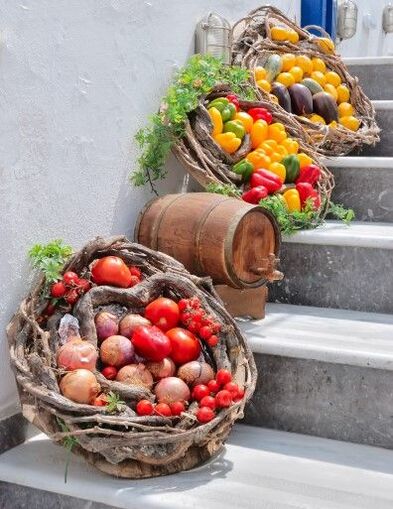
The term itself appeared in the 50s of the twentieth century, it was introduced by a doctor, a professor at the University of Minnesota Ansel Keys. In 1945, he landed in Italy with a group of American soldiers. By observing the locals, Keys found that they tended to have no problems with the cardiovascular system, and they had a longer life expectancy than in his homeland. He suggested, and then proved, that this was the result of a lifestyle and nutritional system. A little earlier, in the late 1930s, Italian nutritionist Lorenzo Piroddi first linked nutrition and susceptibility to diseases such as diabetes, obesity and bulimia, which is why he was called the "father" of the Mediterranean diet. And Ansel Keys lives on a beach in Italy and is up to 100 years old.
Let's list the benefits of the Mediterranean diet.
Strengthens the cardiovascular system. Omega fatty acids from olive oil, nuts, grains, certain vegetables and fruits keep blood vessels clean and elastic.
Prevent or treat diabetes, because the diet is dominated by foods with a low glycemic index and almost no sugar is used, which means fast carbs.
Fiber -rich foods are included in every meal, they guarantee a good metabolism, help lose weight smoothly and maintain positive dynamics over time, improve the state of the nervous system, improve mood, and stimulate brain activity.
Many foods in the Mediterranean diet promote the synthesis of endorphins, dopamine, serotonin and tryptophan, which are called happiness hormones. This reduces the risk of Parkinson's disease, Alzheimer's and dementia in older age.
Chatting with friends, long Sunday dinners with family, picnics in nature, cooking together are part of the culture of Mediterranean countries, which are useful to introduce into daily life to reduce stress and anxiety levels and reinforce positivity.
Prolongs youth and beauty thanks to flavonoids and antioxidants. They reduce damage due to oxidative processes, which worsen internal and external conditions. Selenium, manganese, zinc, vitamins A and E make skin firm, and hair shiny and thick.
There is no shortage of Mediterranean diet.
This helps you switch to proper nutrition and improve your health. This is not seasonal, not limited in time, and implies a varied menu. The only drawback is the inability to lose weight quickly.
But, in fact, it turns out to be added value. Dramatic weight loss is often a trauma for the body: from significant changes in regime, significant loss of normal daily caloric intake, we experience stress. The body responds with poor health, decreased strength, immunity and mood, chronic diseases worsening or emerging if the diet is not controlled.
Yes, for some time the weight is lost quickly, but the brain turns on a protective mode from the possibility of starvation, and even from low -calorie foods the body can store fat as storage. Therefore, most often after the end of the diet, the weight returns, and sometimes even increases.
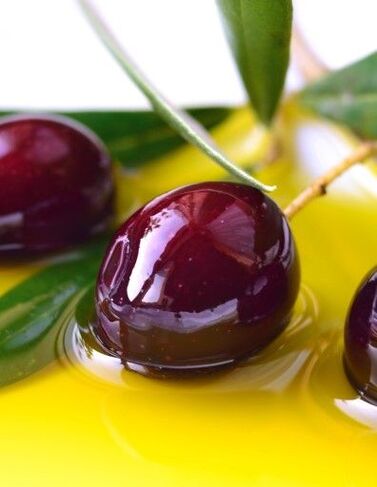
This will not be the case with the Mediterranean diet. You won’t see a quick change, but be patient. You will see the first results in a few months. You should eat five times a day in small portions - so that you do not feel hungry, and the body will receive a variety of necessary nutrients. Gradually, a rational diet will revive the body’s functional systems, metabolism will improve, and weight will return to normal. Add physical activity, at least take a walk, and the effects will be visible.
The list of approved products is extensive. Nutritionists have identified them in the pyramid based on (60%) sources of complex carbohydrates, fats and high-quality vegetables. The first includes whole grains, durum wheat pasta, whole wheat bread, nuts and seeds, and legumes. Products of this group must be included in the daily menu.
Vegetables are served in a variety of varieties. Look for leafy vegetables like spinach and kale, and vegetables with minimal starch like eggplant and zucchini, cauliflower and broccoli, tomatoes, peppers and fennel. The WHO recommends a daily intake of vegetables - 6 servings per day - based precisely on the amount of vegetables in the Mediterranean diet.
Previously, when there was no modern technology for preserving vegetables, cooking was based on seasonal principles. Unfortunately, in our situation, seasonal vegetables are a short-term pleasure. There is a solution: use frozen vegetables. Unlike imported, shock freezing, which is done within hours after harvest at the peak of maturity, preserves almost all the vitamins in it. In winter and spring, the freshness of vegetables is a rather arbitrary concept. Manufacturers take into account the long travel and storage, where they treat it with chemicals.
Beans, lentils, and beans contain complete plant proteins, nutrient complexes and rich fiber. They saturate well and evoke a feeling of satiety for a long time. Combined with legumes, a variety of balanced meals can be prepared. The thick and rich soup will keep you warm in cold weather, and salads are the best choice for dinner. Try eating vegetables and legumes for dinner two to three times a week.
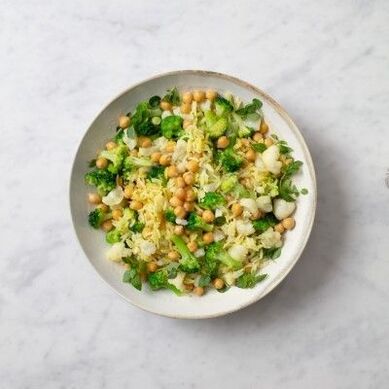
Jasmine rice with beans, mini broccoli, mini cauliflower and truffle oil
Ingredients:
- Beans (beans) Bonduelle 1 tin (310 g).
- Broccoli mini Bonduelle 1 pack (300 g).
- Bonduelle mini cauliflower 1 pack (300 g).
- Jasmine rice 200 g.
- Basil 40 g.
- Curry 1 tsp
- Olive oil 20 ml.
- Salt to taste.
Recipe:
- Cook the rice according to the instructions. Add curry, stir.
- Heat the olive oil in a pan and sauté some cabbage and broccoli.
- Combine cabbage, okra and rice, stir. Salt if necessary. Garnish with basil leaves before serving.
Pasta is not bad if made from durum flour: low in calories, has a rich composition of vitamins and minerals, and easy to digest. In addition, pasta, like cereals, is one of the main sources of vitamin B. Pasta made from non -refined flour provides energy to the body, for example, it is recommended to eat it before doing physical activity.
Of course, all the benefits can be negated if you accompany the dish with a fatty sauce or made into a meat side dish - such a dish has nothing to do with Mediterranean tradition. A light sauce based on olive oil, vegetables, fish and seafood would be the right choice for pasta.
Spaghetti with mini broccoli and pine nuts
Ingredients:
- Pack broccoli (300 g).
- Spaghetti 250 g.
- Pine nuts 40 g.
- Olive oil 20 ml.
- Ricotta 100 g.
- Salt to taste.
Recipe:
- Cook the spaghetti until cooked al dente.
- Boil the broccoli according to the instructions.
- Break 100 g of broccoli with a blender. Mix with ricotta and olive oil.
- Add the remaining spaghetti and broccoli sauce, season with salt and heat in a saucepan over low heat for 2 minutes.
- Fry the pine nuts in a dry pan and sprinkle them over the spaghetti before serving.
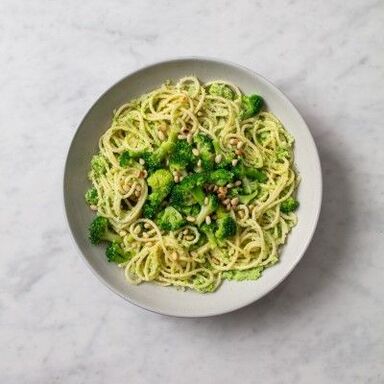
Olive oil, the alpha and omega of the Mediterranean diet, is a gastronomic symbol of the region. Olives were first eaten here thousands of years ago. Untreated, it tastes very bitter, so salty or squeezed from oil.
The reason is oleuropein, a phenolic compound that, along with omega fatty acids and vitamin E, determines the benefits of olives. Phenols are powerful antioxidants, have antibacterial and anti-inflammatory properties, and fight free radicals. Scientists found that 2-4 tablespoons of olive oil a day significantly reduced the risk of coronary heart disease.
Meet vitamin F, do not be surprised. Many people do not know that essential fatty acids have a common name - vitamin F. These are archidonic, linoleic and linolenic acids. The human body does not produce it and only receives it with food.
But remember that not all olive oils are created equal. The best is extra, cooled oil by mechanical methods. Its acidity, i. e. the content of organic acids, does not exceed 0. 8%. During the production process, such oils store vitamins and antioxidants completely; it should be stored in a dark glass bottle at room temperature. It cannot be treated with heat.
Add olives anywhere: in salads, soups, main courses, pies, toast or omelets. Olives have a salty taste; thus, the dish does not require additional salting, which will reduce the amount of salt consumed. Find inspiration in our selection of olive recipes.
The second step of the pyramid is the right source of protein, which is 30% in the Mediterranean diet. Part of the body gets protein from plant foods, most fish and seafood, natural yogurt, cottage cheese, low -fat cheese (cheese made from goat’s and sheep’s milk is very popular), white meats (chicken, turkey, rabbit) and eggs. Foods in this group should be eaten three to four times a week.
Fish should be eaten not only on Thursdays, as a delicious and healthy food book inherited, but several times a week. If you choose between river and sea, choose the second type, and fatty. With it, you will receive not only protein, but also Omega 3 acids, iodine, which are rarely found in food, and excellent vitamin complexes: vitamins A, E, D, C, B. dense muscle fiber structure. Therefore, they are immediately digested, which makes fish an ideal food product.
Talking about fish often raises complaints that the price is expensive and it is almost impossible to buy good fish. Let’s solve these interesting questions.
Not many people manage to buy freshly caught fish. In this case, like vegetables, do not be afraid to freeze. Observe the rules of thawing: on the bottom shelf of the refrigerator, which will take 10-12 hours and store all the nutrients. Again, like vegetables, when buying, note that there are no ice crystals in the package. They are evidence that the fish was stored improperly: the temperature regime was not observed. Do not freeze the fish yourself.
Fish in all countries is an expensive product, but there is a way out here as well. You can not buy salmon or tuna fillets, buy more affordable varieties: cod, mackerel, pink salmon, herring, halibut, whip, saury, sardines. In principle, in Mediterranean countries, most families cook from this type of fish, dishes with them are very tasty and varied. Many people ignore canned tuna, but in vain: it is much cheaper than fresh and equally healthy if made not in oil, but in its own juice. Cooking a salad with it is a pleasure: no need to bother cutting.
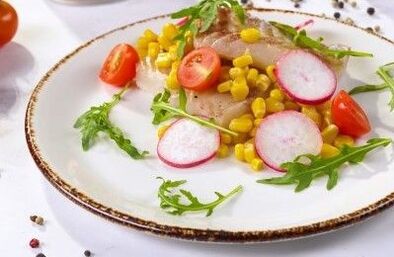
Cod fillet with corn
Ingredients:
- Bonduelle young corn 1/3 can (140 g).
- Fod cod 200 g.
- Radish 2 seeds.
- Tomato cherry 5 seeds.
- Lemon zest 2 secubit.
- Lemon juice 1 tsp
- A vegetable to taste.
- Arugula to serve.
- Salt and pepper to taste.
Recipe:
- Drain the cod fillet, lift the bones with tweezers and place the fish in a baking tin. Then sprinkle a little with lemon juice, rub with a mixture of salt and pepper spices and lemon peel. Bake in the oven at 180 degrees for 15-25 minutes depending on the size of the fillet.
- Cut the cherries in half, cut the carrots into slices. Cut the potion.
- Place the prepared cod fillets on a serving plate. Place corn garnishes, tomatoes, carrots and herbs nearby. Garnish with arugula.
The same goes for seafood: we won’t be targeting lobsters, oysters and lobster, but let’s take a closer look at clams and prawns. Iodine, selenium, zinc, iron, copper, magnesium - this is not a complete list of minerals it contains, plus low calorie content. Shrimp are rich in vitamin B12 - it participates in the production of hemoglobin, and in shellfish - vitamin E, which protects cell membranes from destruction.
The last 10% includes red meat, which is recommended to be eaten no more than once a week, animal fats and moderate carbohydrates. Try to cook the meat in a gentle way - boil or bake, and fry without oil, on the grill. Without desserts, life will not enjoy the joys of sweetness, but still choose healthy desserts. Use a minimum of sugar, the natural sweetness of fruits, honey and even vegetables is enough. For example, sweet young corn itself, a delicious and original dessert, and you can even eat it straight from the can.

Fruit salad with young corn
Ingredients:
- Bonduelle young corn 1 can (340 g).
- Blueberry 70 g.
- Strawberries 70 g.
- Raspberry 70 g.
- Orange 1 pc.
- Walnut 80 g.
- Natural yogurt 400 ml.
Recipe:
- Peel the zest from the oranges. Cut the oranges into slices.
- Drain the cans of corn. Mix corn and berries.
- Cut walnuts and put in yogurt, mix.
- Put fruit salad with young corn in a small bowl, add yogurt with walnuts. Serve with orange slices.
Finally, a few words about spices.
The aroma of scorching heat and Mediterranean garden is contained in rosemary, sage, thyme, marjoram. Parsley and garlic are the simplest and most affordable spices used by the region’s chefs for centuries. A mixture of allspice, Provencal or Italian herbs will fill the dish with interesting meanings and nuances. In addition, they will allow you to use less salt - the brightness of the spices is enough for a full flavor.

There are no forbidden foods in the Mediterranean diet and their list coincides with the foods given by all nutritionists. These are fast food and "junk" foods, industrial semi-finished products, sauces, sweets with preservatives and flavor enhancers.
Drink plenty of water, don’t neglect a glass of dry red wine (but no more! ) And be healthy!















































































